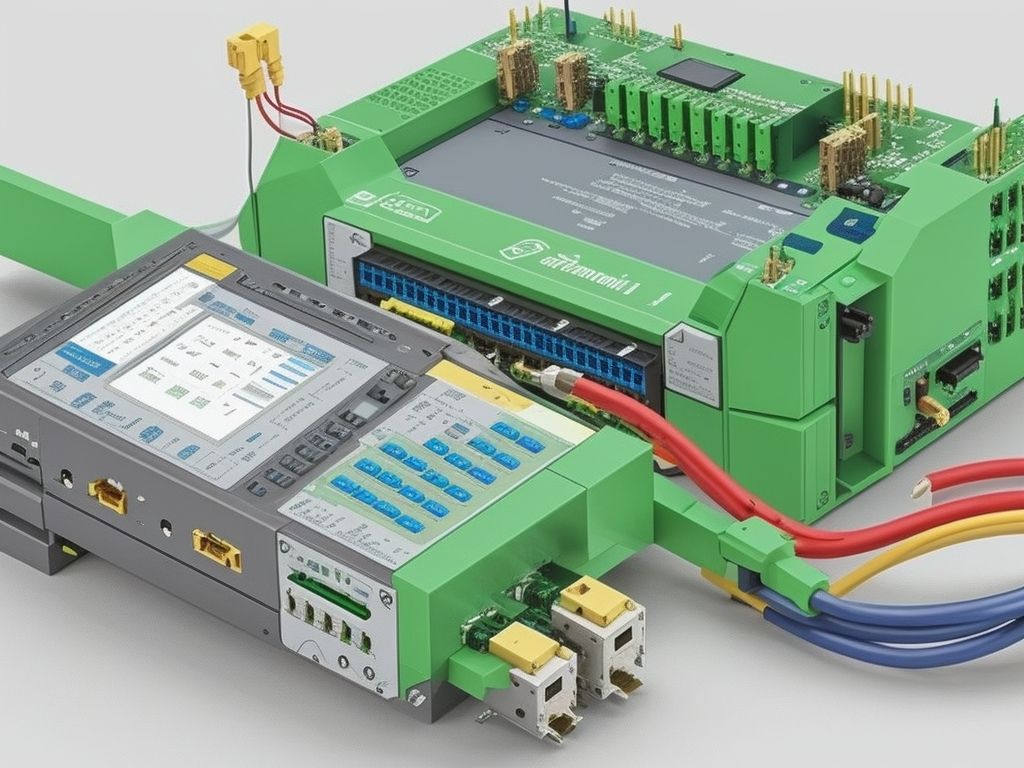How To Choose The Best Lan Tester
In today’s digital age, a reliable LAN tester is essential for smooth network connectivity. It helps to troubleshoot issues, find cable faults and validate configurations. But, there are numerous options on the market, so selecting the best LAN tester can be overwhelming. This article has tips to help you through this process.
When selecting a LAN tester, consider: functionality; compatibility; ease of use.
- Check the functions of different models. Look for features like cable length measurement, wire mapping tests and PoE detection. These will help with a wide range of network problems. Check that the tester works with various cable types, such as Cat5e or Cat6.
- Look at how easy it is to use the LAN tester. Choose one with an intuitive interface and simple menus. This will save time during troubleshooting and help technicians handle network issues. Also, pick a compact, lightweight tester for field technicians who need mobility.
- Invest in a LAN tester with advanced features like VLAN detection or link status monitoring. These additional capabilities can streamline troubleshooting by providing insight into network performance.
Ultimately, select a LAN tester that meets your specific needs, to enhance efficiency and productivity.
To summarize, when choosing the best LAN tester: look at functionality; consider cable type compatibility; prioritize ease of use; opt for a compact design; contemplate advanced features. Following these suggestions will help you confidently select the best LAN tester. Get a powerful tool that boosts productivity and minimizes downtime.
Importance of choosing the best LAN tester
Choosing the right LAN tester is essential. Here are five reasons why:
- Accurate Diagnosis: High-quality LAN testers can diagnose network problems quickly, minimizing downtime.
- Time & Cost Savings: Investing in reliable LAN testers can avoid unnecessary repairs and reduce maintenance costs.
- Enhanced Performance: The best LAN testers offer features that test and analyze speed, stability, and functionality.
- Future-Proofing: Choose a LAN tester that supports current protocols and standards, ensuring compatibility for future upgrades.
- Peace of Mind: Using a trusted LAN tester gives IT professionals confidence in their network’s reliability.
Moreover, some LAN testers come with added functions like cable mapping and length measurement. This helps in comprehensive assessment of a network’s health.
Here’s an example: A small business was having trouble with their internet connection. After getting a reputable LAN tester, they discovered a faulty cable connection between their router and modem. This issue was quickly fixed, leading to improved connectivity.
Factors to consider when choosing a LAN tester
When choosing a LAN tester, there are several factors to keep in mind. Let’s take a look at these essential considerations.
- Connectivity: Check if the LAN tester supports various connection types, such as RJ45 or WiFi.
- Test Type: Consider the tests you need to do on your network, such as cable length or signal strength.
- Features: Look for features like cable mapping and traceroute. These can improve your troubleshooting and save time.
- Portability is another key factor. Choose a LAN tester that is lightweight and easy to carry if needed.
- Price is also important. Don’t just pick the cheapest option. Invest in a reliable LAN tester – it’ll be more cost-effective in the long run.
Read reviews from other users or get recommendations from professionals. Their experiences can give you insight into the performance and reliability of different LAN testers.
By considering these factors and your networking needs, you’ll be able to choose the best LAN tester for your requirements and ensure smooth network operations.
Researching and comparing different LAN testers
To find the best LAN tester, research and comparison is vital. Think about testing capabilities, price range, and user reviews. Analyzing these helps you decide which tester meets your needs.
Create a table to compare key features and specs. This helps to organize your comparison and decide which option is best. Here’s an example:
| Feature | Model A | Model B | Model C |
|---|---|---|---|
| Testing Capabilities | Yes | Yes | No |
| Price Range | $50-$100 | $100-$150 | $150-$200 |
| User Rating | 4.5 | 3.8 | 4.7 |
| Brand Reputation | Good | Average | Excellent |
Additionally, consider customer support and warranty options. My friend had to learn this the hard way. He picked Model B due to its affordability. But it had technical issues that he couldn’t fix without help.
Do thorough research and compare LAN testers’ features and specs. This helps you make an informed choice that fulfills your testing needs. Enjoy testing!
Testing and evaluating LAN testers
Test the LAN tester’s different functionalities, such as wiremap, length measurement, and continuity check. Make sure it supports both shielded and unshielded cables.
Compare measurements with known values to verify accuracy. Look for a tester that provides precise measurements for accurate troubleshooting.
Evaluate user-friendliness by considering its interface, buttons, and display. Look for intuitive controls and a clear display for easy understanding and interpreting of results.
Assess the durability of the LAN tester by examining build quality and materials used. A rugged tester should endure rough handling in various environments without affecting functionality.
Ensure the tester is compatible with different cable types, such as Cat5e, Cat6, and fiber optic. This increases versatility and usability.
Look for additional features like network tracing or PoE detection. Testers with detailed reports or logs for documentation are also a plus. Connectivity options like Wi-Fi or Bluetooth for convenient data transfer are also worth considering.
Before buying, read reviews from users or consult IT professionals for their experiences with different LAN testers. Their feedback can help you select a reliable option that meets your needs without overspending.
Making a decision and purchasing the best LAN tester
- Understand your necessities. Figure out the type of network testing you need. Basic connectivity testing or advanced troubleshooting? This will help you limit your choices and pick a LAN tester that meets your needs.
- Do your research. After you’ve identified your requirements, look into the various LAN testers on the market. Check user reviews, tech specs, and the rep of the manufacturer. This will give you an idea of which models are dependable and perform well.
- Set a budget. LAN testers come at different price points, so figure out how much you’re ready to pay for a quality device. Don’t splurge on features you don’t need or can’t afford.
- Compare features. Make a list of the features essential for your network testing needs and compare them across different models. Cable length measurement? Wiremap testing? Ethernet speed detection? Fault identification? Find a LAN tester that offers the most value for money based on these features.
- Also, check warranty, customer support, and ease of use.
- Take action now by researching different models and comparing their features. Buy a high-quality LAN tester and save time and effort when troubleshooting network issues. Ensure optimal performance for your connected devices.
Conclusion
Choose the best LAN tester with care. What should you consider? Your needs, budget, type of network, testing level and features are all key. Features such as cable diagnostics, wiremapping, connectivity testing, user-friendliness and durability. Also think about whether a handheld or desktop tester suits you best. Handhelds are portable, desktops better for larger networks. PoE detection is important too. It helps you see whether ports deliver power. A real story shows its significance. A company had frequent connectivity issues. Until they invested in a quality tester. It quickly identified faulty cables and connections. Saving time, effort and frustration!
Frequently Asked Questions
1. What is a LAN tester and why do I need one?
A LAN tester is a tool used to diagnose and troubleshoot issues in a Local Area Network (LAN). It helps to identify connectivity problems, cable faults, and network performance issues. It is essential to have a LAN tester to ensure smooth operations and efficient network performance.
2. What features should I look for in a LAN tester?
When choosing a LAN tester, consider features like cable testing, wire mapping, network discovery, and PoE (Power over Ethernet) detection. It should also support various cable types and offer easy-to-read results. Additionally, consider the durability and portability of the tester.
3. Can I use a LAN tester for both Ethernet and Wi-Fi networks?
No, a LAN tester is specifically designed for Ethernet networks. It helps in diagnosing wired connections, cable faults, and network performance. For Wi-Fi networks, you would need a different tool, such as a Wi-Fi analyzer, to measure signal strength and analyze network performance.
4. How much does a LAN tester cost?
The cost of a LAN tester can vary depending on the brand, features, and capabilities. Basic testers can range from $20 to $50, while professional-grade testers with advanced features can cost several hundred dollars. Consider your specific needs and budget before making a decision.
5. What is the importance of a warranty when purchasing a LAN tester?
A warranty is crucial when buying a LAN tester as it provides protection against any defects or malfunctions. It ensures that you can get a replacement or repair if the tester stops working within the warranty period. Look for a tester with a substantial warranty to ensure peace of mind and value for your money.
6. Are there any specific brands that are known for producing high-quality LAN testers?
Yes, several brands are well-regarded for their high-quality LAN testers. Some popular brands include Fluke Networks, Ideal Networks, TRENDnet, and Cable Matters. It is advisable to research and read reviews to find the brand and model that best suits your requirements and budget.
- How To Choose The Best Lap Desk For Laptop And Writing - 15 October 2023
- How To Choose The Best Projection Screen With Foldable Stands - 14 October 2023
- How To Choose The Best Antifungal Pill For Dogs - 13 October 2023



